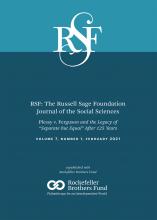Abstract
This article explores how voter ID laws further the dismantling of voting rights and the promises of full political engagement for racial minorities, especially African Americans. The authors highlight the racial politics that inform the emergence of these laws, and the racial intent and impact these laws have in diluting minority voting access and therefore political power. It begins with a short historical overview of voting rights since the eradication of slavery, then offers background on the current legal climate in which voter ID laws are situated. The essay concludes with an analysis of Frank v. Walker as a case study exposing the intent and impact of voter ID laws.
- © 2021 Russell Sage Foundation. Shah, Paru, and Robert S. Smith. 2021. “Legacies of Segregation and Disenfranchisement: The Road from Plessy to Frank and Voter ID Laws in the United States.” RSF: The Russell Sage Foundation Journal of the Social Sciences 7(1): 134–46. DOI: 10.7758/RSF.2021.7.1.08. Direct correspondence to: Paru Shah at shahp{at}uwn.edu, University of Wisconsin, Milwaukee, PO Box 413, Milwaukee, WI 53201, United States; and Robert S. Smith at robert.s.smith{at}marquette.edu, History Department, Marquette University, 1618 W. Wells St., Milwaukee, WI 53233, United States.
Open Access Policy: RSF: The Russell Sage Foundation Journal of the Social Sciences is an open access journal. This article is published under a Creative Commons Attribution-NonCommercial-NoDerivs 3.0 Unported License.






